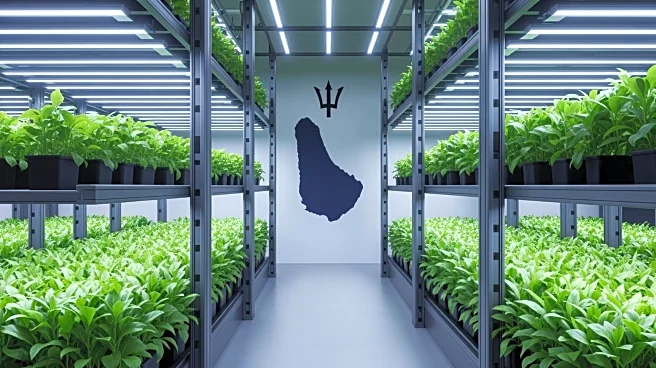What's Happening?
Indoor Vertical.Farm has launched a pilot project in Bridgetown, Barbados, in collaboration with the Barbadian Government. This initiative introduces a fully off-grid vertical farming system designed for
research, training, and education. The project aims to strengthen food security in island nations by integrating local production, training, and renewable energy. The installation consists of three container units operating under a solar-battery microgrid, with each unit equipped with its own HVAC, fertigation, and irrigation system. The project also includes delivering Compact Ultra units to government departments, R&D centers, and educational institutions, serving as both production systems and living classrooms.
Why It's Important?
This project is significant as it addresses the high dependency on imported food in Barbados, where approximately 85% of food is imported. By demonstrating the potential for local production, the initiative aims to improve food quality, reduce transport costs, and minimize waste. The partnership aligns with regional goals to develop climate-resilient food systems, reducing food-import dependence and promoting sustainable agriculture. The project also highlights the role of renewable energy in creating resilient food systems, offering a model for other island nations facing similar challenges.
What's Next?
Indoor Vertical.Farm plans to expand its program to other Caribbean islands, having already signed five letters of intent with additional partners. The company is also preparing to open an experience and R&D center in Hasselt, Belgium, to showcase its technology and test new crops and growing methodologies. This expansion could further enhance the resilience of food systems in island nations, promoting local capability and sustainable agriculture practices.
Beyond the Headlines
The Barbados pilot project exemplifies how modular, solar-powered vertical farming can adapt to environments with intersecting challenges of imported food, high energy costs, and climate risk. By training local farmers and integrating renewable energy, the initiative fosters sustainable growth of fresh produce, directly benefiting communities. This approach could serve as a blueprint for other regions seeking to enhance food security and sustainability.










